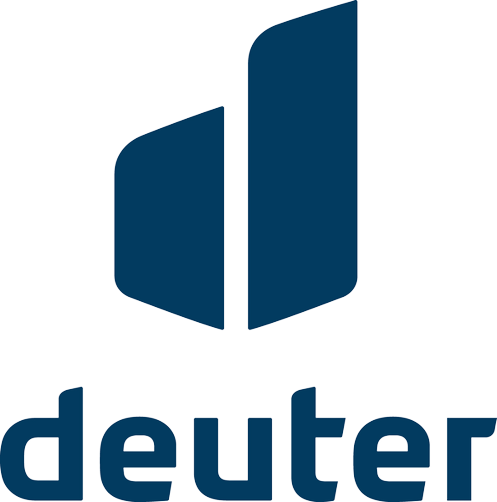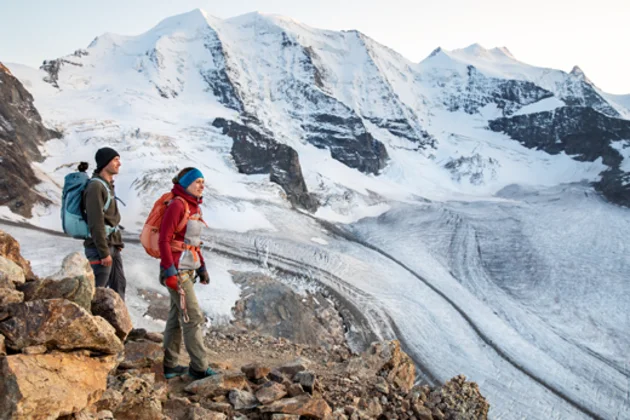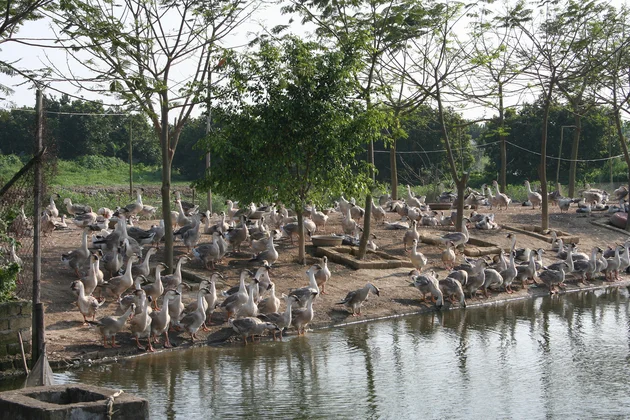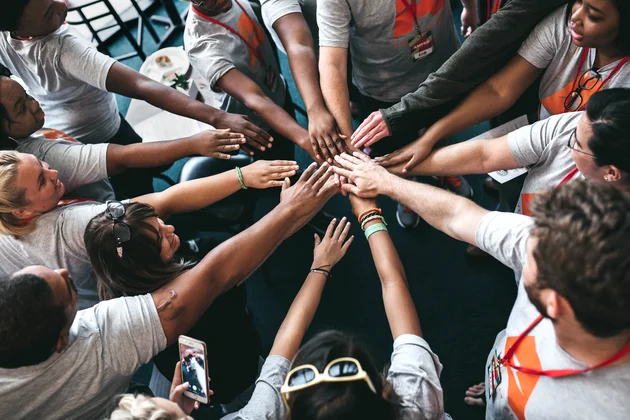DEUTER’S
ACTIONABLE
AREAS
ACTIONABLE
AREAS
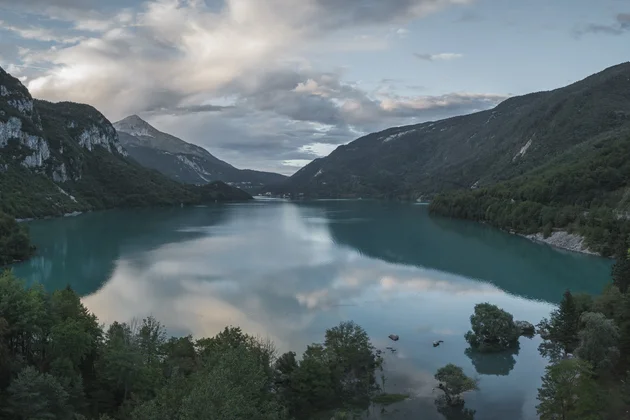
Find out more about our goals in these fields of action:
climate protection, environmental protection and animal welfare.
CLIMATE PROTECTION
OUR PROMISE
We will continue to identify and reduce our carbon footprint, and offset any unavoidable CO2 emissions through climate-positive projects.
OUR OBJECTIVE
To achieve climate neutrality at our headquarters and for 25% of our collection by 2023. We also aim to cut the carbon footprint at all deuter sites and our production facilities across the globe. In doing so, we are contributing to the goals of the Paris Climate Agreement.
OUR CLIMATE STRATEGY
The climate crisis is the biggest challenge mankind is currently facing. The increase in industrialization worldwide is playing a major role in altering our climate. The textile industry ranks just behind the oil industry in terms of greenhouse gas emissions and even ahead of transportation and power generation. At 1.2 trillion tons of CO2 emissions per year, the production of textiles causes more greenhouse gases than all international flights and all shipping combined. This is driven by steadily growing production volumes and ever-shorter product life cycles. The extraction of raw materials, processing and transport are the main sources of emissions where textiles are concerned. More than 170 countries have now committed themselves to joint climate action with the Paris Climate Agreement. The international resolution is intended to ensure that global warming does not surpass 1.5 degrees Celsius. In order to achieve this, we have to reduce carbon emissions worldwide by 50%. As a company that acts responsibly and takes its role in society seriously, we share the objectives of this agreement and are committed to taking all appropriate action within our power.
To this end, we have embarked on an ambitious path and initiated structured processes. Following extensive analysis, we are implementing clear, integrated strategies that will help us achieve our climate target by 2028 through carbon reduction and offsetting. We believe the greatest potential lies in reducing emissions upstream in our supply chain. Here, we need to work with our partners to find adequate and sustainable solutions. However, in order to also reduce the impact on global warming in the areas of product design and development, we are replacing existing processes and materials with more climate-friendly alternatives, such as recycled materials, spin-dyed fabrics etc. The longevity of our products also contributes to a reduction in carbon emissions, because by extending product life cycles by 10%, for instance, we not only reduce CO2 by 8%, but also cut water consumption by 10% and waste by 9%, and even cut resource consumption costs by 9%.*
IN DOING SO, WE ARE CONTRIBUTING TO THE FOLLOWING SDGS:
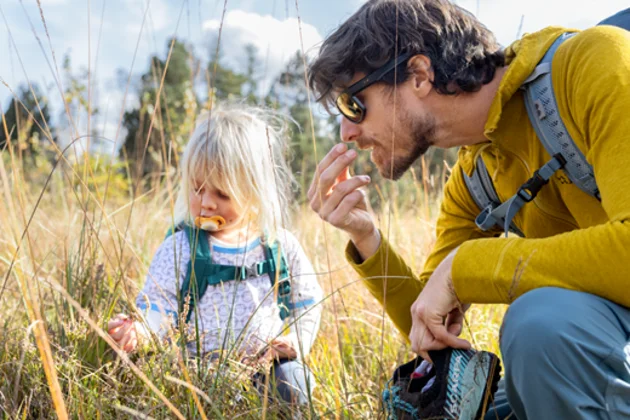
ENVIRONMENTAL PROTECTION
OUR PROMISE
We will do our best to minimize the impact of our products on the environment.
OUR OBJECTIVE
To protect the environment by selecting resources carefully, reducing the amount of resources used and avoiding harmful substances. And to engage in environmental projects together with partner organizations and NGOs, and continually expand these.
OUR STRATEGIC MEASURES
- Sustainability is reflected in our strategic product development from the get-go. Before embarking on the development of new products, we investigate the degree of sustainability we can incorporate. We’re also consistently improving them so that they last longer, are easier to repair, or are made from recycled or certified materials.
- Our policy is to incorporate existing options into product planning. In terms of innovation, we will proceed with concepts for sustainable materials and products so that at least 50% of our products are made of recycled core materials by 2025 at the latest. We’re facing a number of major challenges in this respect. We need to close material loops, develop plastics without petroleum and employ new technologies that save resources.
- Our materials and product experts are experimenting with new approaches to turn our vision into reality. In this case, interacting with other companies and the Textile Alliance (e.g. in the circular economy expert group) is vital. What’s more, we’re enhancing in-house systems to provide performance indicators and make progress easier to evaluate.
- As part of the bluesign® partnership, we work with our suppliers and manufacturers to create more resource-efficient and environmentally friendly products and production processes. We make use of all the tools that the bluesign® system offers and have set ambitious goals: We want to keep increasing the number of bluesign® products in our collection, and use a minimum of 70% sustainably-made, bluesign®-certified main materials (fabrics).
- Our efforts have also helped us attain Green Button (Grüner Knopf) certification. To bear the international hallmark for sustainable textiles, initiated by the German government, products must be manufactured in line with strict environmental and social standards as laid out by the government. The Green Button logo indicates to consumers that they are buying sustainable textiles. All of our bluesign® certified products automatically bear the Green Button seal.
- We’re also looking at making improvements further down the supply chain because this is where consumption of energy and chemicals is the highest. We help our suppliers to manage chemicals so that the environment, wastewater, and climate are not polluted unnecessarily. Training courses, flyers and certification (e.g. bluesign®) help to put our message across.
- And not just products. The packaging we use also needs to be as sustainable as possible. Which is why we’re working on material-saving and recyclable alternatives to our current packaging.
- As a member of the European Outdoor Conservation Association (EOCA), we support select nature conservation projects worldwide. We want to forge ahead with this commitment and nominate at least one of our own projects for association support and implement it, if selected.
- 10% of revenue from the sale of the deuter Infiniti series, an upcycled collection made using fabric remnants from past collections, goes to the 1% for the Planet organization. This organization supports the work of carefully selected partners in six core environmental areas: Climate, land, water, food, wildlife and pollution.
- We’re also reviving the successful deuter dirtbag concept. The little bag has already encouraged lots of people to pick up any waste they find, or have dropped themselves on mountain treks, and take it back home with them.
- We want our products to give our customers lasting value. However, some items are only required in certain phases of life, or in special circumstances, and purchasing them is unsustainable given how little they’re used. Which is why we launched a free child carrier rental scheme. The scheme has been well received and will be extended to include other product categories in addition to child carriers.
- Our Second Life products are backpacks with signs of minor wear and tear, or manufacturing flaws. They could equally be returns and product samples no longer required. These items are carefully and expertly restored by our experienced repair service team. This option extends the life of our products, prevents waste and allows customers to purchase high-quality, fully functional gear for less – and contribute to saving the environment at the same time.
- And by offering a repair service, we extend the working life of our products even more. In Germany alone, 3,500 items were repaired in just one year (2018-2019), which equates to 14 repairs each working day. We also want to help customers carry out repairs themselves. As a result, we’re planning a DIY repair guide, repair courses and the option to order more spare parts than was possible in the past.
- No deuter products have contained PFCs since 2020. This will remain the case in future because we don’t use any durable water repellents (DWR) containing PFCs in our production lines.
IN DOING SO, WE ARE CONTRIBUTING TO THE FOLLOWING SDGS:
- SDG 3: Good health and well-being
- SDG 6: Clean water and sanitation
- SDG 8: Decent work and economic growth
- SDG 9: Industry, innovation and infrastructure
- SDG 12: Responsible consumption and production
- SDG 13: Climate action
- SDG 14: Life below water
- SDG 15: Life on land
- SDG 17: Partnerships for the goals
ANIMAL WELFARE
OUR PROMISE
No animals will suffer or be harmed in the creation our products.
OUR OBJECTIVE
To consciously avoid animal-based products where possible. We ensure, where possible, that all components used in our production chain are vegan.
OUR STRATEGIC MEASURES
- Where it’s in our power to do so, we ensure that all components used in the production of our backpacks are vegan.
- All our down sleeping bags are made using RDS-certified down since 2015 and carry bluesign® certification too.
- We source essential functional natural materials like down as a waste product from the food industry and through sustainable, certified supply chains.
IN DOING SO, WE ARE CONTRIBUTING TO THE FOLLOWING SDGS:
Find out more about our goals in these fields of action:
employees, customers and society.
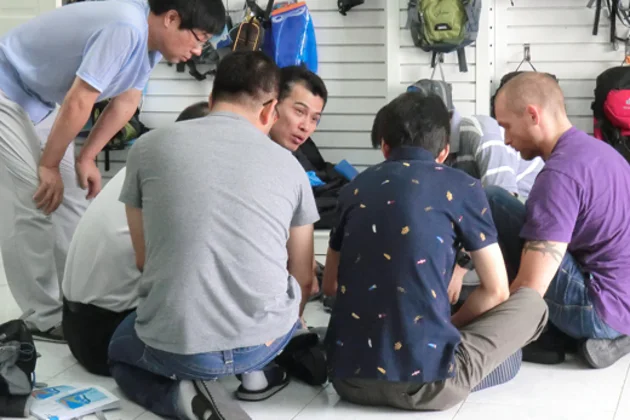
EMPLOYEES
OUR PROMISE
We believe that everyone who is involved in the manufacturing of our products, either directly or indirectly, should have fair working conditions.
OUR OBJECTIVE
To ensure both our own co-workers in Germany and those of our manufacturing partners benefit from fair working conditions, fair pay, social justice, equal opportunities and the possibility of leading a healthy, balanced lifestyle.
OUR STRATEGIC MEASURES
- We’re committed to implementing the ILO (International Labor Organization) core labor standard as a fundamental labor principle and right in our supply chains globally. The ILO’s fundamental principles are freedom of association and the right to collective bargaining, elimination of forced labor, abolition of child labor, and prohibition of workplace discrimination.
- As part of our longstanding collaboration with the Fair Wear Foundation (FWF), we focus on consistently implementing programs. We also learn from and interact with each other in workshops following audits and we work with suppliers to achieve specific improvements on particular issues, such as wages, health and safety and overtime.
- We want to help our partners gradually raise basic wages to recognized living wage benchmarks by 2025 and pay these to over 70% of the workforce. In raising wages, we base our decisions on the Global Living Wage Coalition study and use the FWF’s Wage Ladder Tool.
- By joining forces with other members of the Textile Alliance in the Living Wage initiative, we aim to help improve wages in the textiles industry as a whole.
- We also want to offer our workforce financial security and work hard to implement a balanced, fair and transparent wage structure. Permanent employment contracts and a model for company pension schemes provide planning security and a basic safeguard against poverty in old age.
- As a member of the FWF, we aim to increase our co-workers’ independence and sense of responsibility for their lives. Which is why we conduct regular training on worker empowerment, gender equality, labor minute costing, and health and safety for the whole workforce, brief our employees about the Code of Labor Practices (CoLP), current legislation and employee rights and strive to improve communication so that people learn to help themselves should disputes occur.
- Here in Germany too, our focus is on our employees’ professional and personal development. Personal development requirements and goals are integral to co-workers’ annual appraisals. Tailored upskilling programs are then agreed.
- When we employ people, we check whether applicants have the right qualifications and are a good fit. Criteria like gender, skin color or ethnicity don’t play a role. Salaries are compared and set as objectively as possible and not determined based on gender.
- Personal flextime and part-time models, and subsidized childcare also help parents get back into the workforce.
- As a member of the Partnership for Sustainable Textiles (Textile Alliance for short), we support producers in implementing the partnership’s goals by providing frequent upskilling programs.
- As part of our bluesign® commitment, it’s our task to minimize health risks to our production staff. For example, we try to reduce any negative impact, not only on the environment, but on co-workers, by ensuring adequate safety systems and measures are in place, providing PPE (Personal Protective Equipment) and adopting good chemical management practices.
- And so at deuter, we incorporate responsibility – toward our fellow humans and nature – into our daily business practices. We raise co-workers’ awareness about the importance of a sustainable mindset across all departments and in their private lives, and we frequently run comprehensive CSR courses.
- Within the framework of the deuter Promise, we disclose the results of our action plan to our employees in a transparent manner and report clearly on what degree our targets have been achieved in our annual Social Report.
IN DOING SO, WE ARE CONTRIBUTING TO THE FOLLOWING SDGS:
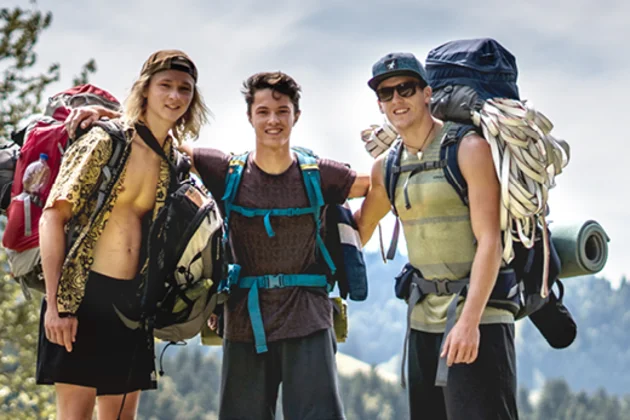
CUSTOMERS
OUR PROMISE
We design our products with the aim of maximizing their usable lifetime and minimizing their impact on people, animals and the environment.
OUR OBJECTIVE
To make products safely and of high quality for specific customer demands, that are sustainable and long-lasting to generate better value.
OUR STRATEGIC MEASURES
- We’ve joined forces with several cable car companies in the Allgäu region of Germany to set up a free child carrier rental program because purchasing them is costly given how little they’re used. The scheme has been well received and will be extended to include other product lines, in addition to child carriers.
- Thanks to our repair service, we can extend the usable lifetime of our products for as long as possible. In Germany alone, 3,500 items were repaired in just one year (2018-2019), which equates to 14 repairs each working day. We also want to help customers carry out repairs themselves. As a result, we’re planning a DIY repair guide, repair courses and the option to order more spare parts than was possible in the past.
- To help our customers make informed purchasing decisions, we disclose our sustainability measures transparently and comprehensibly as part of our deuter Promise strategy, ensure they can be quantified wherever possible, and report publicly on the progress of implementation annually in our Social Report
- We use our reach to educate our customers on the importance of sustainable consumption, and raise awareness on important issues through our communications channels. The purpose of the deuter Promise Tour is also to provide a platform for interacting with customers.
- In addition to product features, quality and price, sustainability has now become one of the key purchasing decision factors. Which is why we provide a training program for retailers in specific product areas, as well as on important CSR topics so that retailers are able to advise customers properly.
IN DOING SO, WE ARE CONTRIBUTING TO THE FOLLOWING SDGS:
- SDG 12: Responsible consumption and production
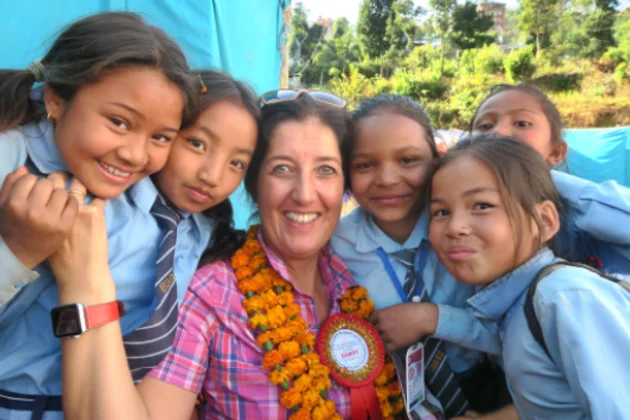
SOCIETY
OUR PROMISE
As an international brand we use our influence to bring about positive change in society.
OUR OBJECTIVE
To help people in need and organizations that fight for equality and better lives. And participate in initiatives in order to bring about social change.
OUR STRATEGIC MEASURES
- Our business is centered around people – whether they are co-workers, customers, business partners or shareholders – and we always strive to create a balance between economic, ecological and social considerations. Our code of conduct is based on these foundations and establishes the principles for our business conduct in a transparent and binding manner.
- Locally, in Gersthofen, Germany, we have become a significant entity. And so we view it as our social responsibility to give back to the area that’s our home. Which is why we’ve joined forces with business development initiative A3Regio and the Chamber of Industry and Commerce Swabia to give regular presentations on sustainable business practices. We’re also involved with some non-profit associations and organizations that promote social equality, inclusion and support for those in need. We help establish welfare facilities by providing funding, or support in the form of donations in kind.
- As a member of the Partnership for Sustainable Textiles (Textile Alliance for short), we support producers in implementing the partnership’s goals by providing frequent upskilling and training programs on topics such as Worker Empowerment, Gender Equality, Labour Minute Costing, and Health & Safety. We assume responsibility for the organization, knowledge transfer and costs of these.>>> link Textilbündnis unter Standards auf unserer Seite
- We embrace our social responsibility and disclose our strategic measures transparently and comprehensibly as part of our deuter Promise strategy, ensure their measurability wherever possible, and report publicly on the progress of our efforts annually in our Social Report.
- We use our reach to raise awareness about important topics and disseminate information through our communications channels. The purpose of the deuter Promise Tour is also to provide a platform for interacting with customers.
